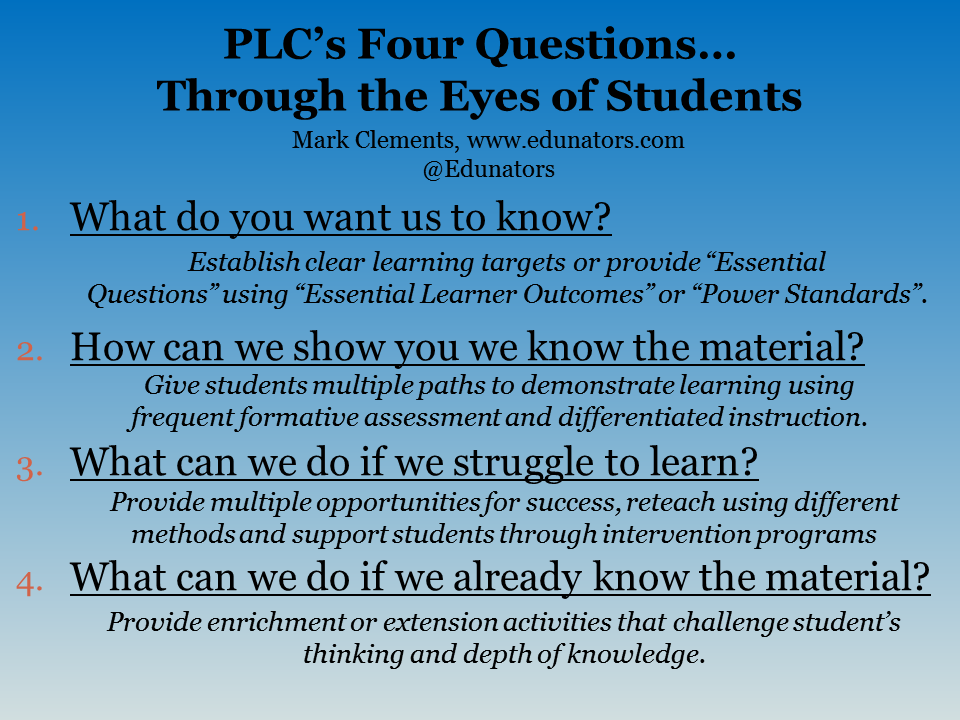If your school operates as a Professional Learning Community, chances are you’re very familiar with the Four Critical Questions originally developed by Rick DuFour. They’re essential whenever first starting a collaborative team in a school and well worth reviewing from time to time as you carry on your work.
However, what if we re-imagined these questions through the eyes of our students? What sort of impact would this have on the way we lesson plan? Turns out what we get is a blueprint for how we should go about lesson planning in our classrooms.
1. What do you want us to know?
Spend some time making sure students understand what it is they’re trying to learn. In some cases, this may take A LOT of time, especially at first. Simply writing the objective on the board isn’t enough, as Formative Assessment guru Jan Chappuis says “On the board is not in their head.” Likewise, simply putting the objective in student friendly terms won’t get the job done either.
Instead of asking a student “What are you working on?” try asking them “Why are you doing this?” For example, if students in Science class are building a model of a cell and you ask them why, the correct answer isn’t “Because you told me to too?” The correct answer is “To better learn how to identify the parts of a cell and what they do.” It takes practice, but they get it eventually. Once that happens, students begin learning with a purpose and their motivation shifts from “task completion” to actual learning.
2. How can we show you we know it?
Teachers and administrators often come at this question from the perspective of “How will we know…” which is certainly talking about assessment, both formative and summative. Students look at this from the unique perspective of having to SHOW YOU they’ve learned something. Maybe they’re proud to have learned it or maybe they just want you off their back, either way, when a student knows what proficiency looks like they’re much more likely to achieve it.
Consider also that this is a GREAT time to Differentiate Instruction. Do you really care how a student shows you they’ve learned something as long as they can show you they’re proficient in what you need them to know? Give them some choices and watch what happens. Click Here to learn Three Easy Ways to Differentiate Instruction or How to Differentiate Instruction Using Layered Curriculum.
3. What should we do if we struggle to learn it?
Do your students get a second chance? Do they know this? So many teaches are afraid of students refusing to work if they keep getting chance after chance but in reality, multiple chances breeds an atmosphere where failure is ok as long as it’s learned from and students feel empowered to take positive risks. By showing students that if they don’t get something the first time there is still a “Plan B” or “Plan C” if necessary, teachers can reposition themselves from the “Assigner of Tasks” to the “Ally of Assistance.” Teacher and student can now work together to learn an objective, making the objective the bad guy, not the teacher.
Not only should great teachers develop multiple ways to help struggling students, they should ensure the students know those second chances exist and that if they learn from their failures, they will succeed.
4. What can we do if we already know this?
Enrichment shouldn’t be something students are pulled from regular classes to receive, nor should it be mindless busy work that’s less challenging than the work required to be proficient. Once a student has demonstrated proficiency, make sure you have a plan to inspire these students to keep working. Teachers often think of this as a classroom management issue, and it can be, but more importantly, students who already know classroom material need to be challenged without feeling like they’re being “punished” by having to do more work. Students who have mastered grade level material deserve to be inspired and challenged in the same way their struggling classmates deserve an opportunity to try again if they’re struggling.

